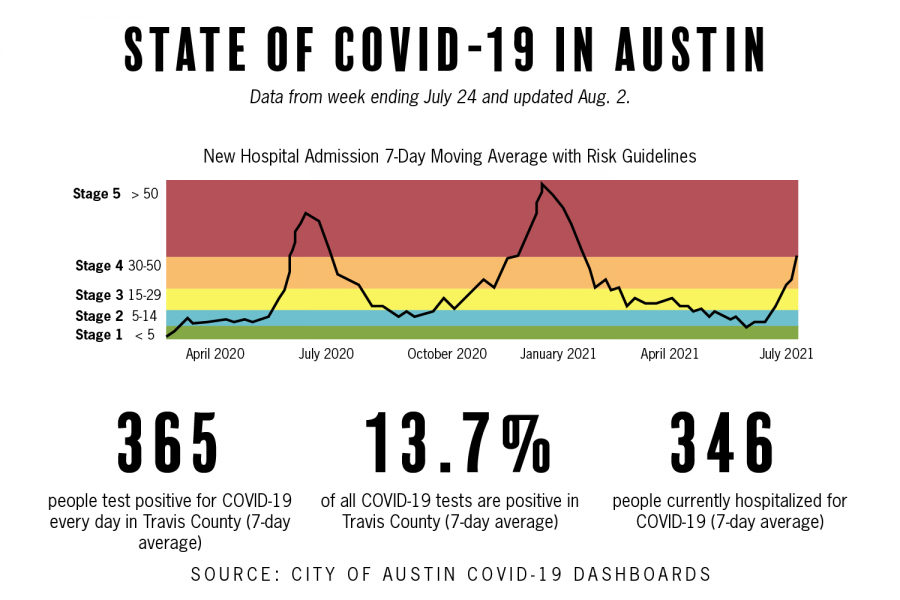Amid delta variant spike, UT announces it will remain at full capacity this fall
August 9, 2021
Editor’s Note: This article first appeared as part of the August 2 flipbook.
The city of Austin moved into Stage 5 guidelines Friday for the first time since December, encouraging residents to mask up and avoid public gatherings. UT still plans to hold classes in person for the fall semester, according to UT President Jay Hartzell.
The rise in cases, triggered by the delta variant, is mainly impacting unvaccinated individuals, said Rama Thyagarajan, an assistant professor in the department of internal medicine at Dell Medical School. However, the influx of new patients in Austin hospitals are mirroring last summer’s numbers, with only 16 staffed ICU beds available July 30 in Travis County, according to the city of Austin. Thyagarajan said the best way to curb the increase in cases is for people to get vaccinated.
“About 97% of the hospitalization is happening in the unvaccinated to the point that the (Centers for Disease Control and Prevention) directors are calling it a disease of the pandemic of the unvaccinated,” Thyagarajan said.
Hartzell said in an email to the UT community that the University does not have plans to introduce new restrictions and expects to hold classes in full capacity during the fall semester.
Steven Ding, president of UT Senate, said the University is bound by Gov. Greg Abbott’s restrictions against mask and vaccine mandates in public schools.
“It’s really frustrating from our perspectives because Austin is in Stage 5 now and lots of COVID (is) spreading in the community,” Ding said. “Even hospitals are getting overwhelmed.”
Kaitlyn Johnson, a postdoctoral researcher in epidemiological modeling for the UT COVID-19 Modeling Consortium, developed a COVID-19 dashboard that predicts future trends for cases in the Austin-Round Rock Metropolitan Statistical Area. Johnson also helped to develop another site that provides the number of hospital beds occupied and the percentage of the Travis County population that tests positive.
Johnson said 289 patients are currently hospitalized due to COVID-19, with 101 in the ICU and 55 on ventilators as of July 24.
“We are very rapidly approaching our health care capacity, and so we need to turn things around and reduce transmission immediately as much as possible,” Johnson said.
Thyagarajan said the delta variant is one of the many mutations COVID-19 has showcased over the last two years. The variant first emerged in India and spread to over 100 countries. The delta variant is much more transmissible than the original strain of the virus, Thyagarajan said.
“We don’t know many other symptomatic differences between the new strand and honestly, it is irrelevant,” Thyagarajan said. “Over 90% of the cases are because of the delta variant and the symptoms are still fevers, body aches, sore throat, cough, loss of taste and smell.”
Ding said the Faculty Council is working on alternatives for students and staff in terms of class structures and capacity.
“We’re hoping that the Dean’s and the Provost Office will give faculty more accommodations to be able to teach in person if they want,” Ding said. “There’s a lot of faculty members who have young children who aren’t eligible to receive the vaccine, and are concerned for a lot of them coming to campus and having kids at home.”











